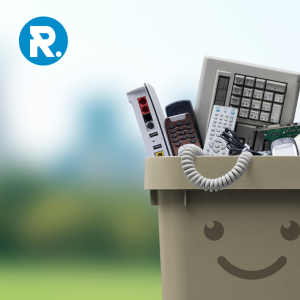Innovations in Waste Management: How Technology is Changing the Industry

The waste management industry is undergoing a major transformation, thanks to advancements in technology. At Rubicon, we’re at the forefront of this change, utilizing cutting-edge solutions to improve efficiency, reduce waste, and promote sustainability. Here’s a straightforward look at the latest innovations and how they’re making a difference in waste management.
Smart Waste Management Systems
One of the most exciting developments in waste management is the introduction of smart waste management systems. These systems use sensors and IoT (Internet of Things) technology to monitor waste levels in real-time. By placing sensors in bins and dumpsters, we can track how full they are and optimize collection routes accordingly. This not only reduces the number of unnecessary pickups but also helps to lower fuel consumption and greenhouse gas emissions.
How Rubicon is Using This Technology: Rubicon employs smart waste sensors to enhance our collection services. By analyzing data from these sensors, we can adjust routes and schedules, ensuring that waste is collected efficiently and at the right time.
Advanced Sorting Technologies
Sorting waste efficiently is crucial for recycling and resource recovery. Recent innovations in sorting technology include AI-powered systems that can automatically separate different types of materials, such as plastics, metals, and paper. These systems use machine learning algorithms to improve sorting accuracy over time, leading to higher recycling rates and less contamination.
How Rubicon is Using This Technology: At Rubicon, we leverage advanced sorting technologies to streamline our recycling processes. Our AI-driven systems help us ensure that recyclables are sorted correctly, which maximizes the quality and value of recycled materials.
Waste-to-Energy Technologies
Turning waste into energy is an innovative solution that addresses both waste management and energy needs. Technologies like anaerobic digestion and waste incineration can convert organic waste and other materials into renewable energy sources, such as biogas or electricity. This process reduces the volume of waste sent to landfills while providing a sustainable energy alternative.
How Rubicon is Using This Technology: Rubicon explores waste-to-energy solutions as part of our commitment to reducing landfill use. By partnering with facilities that utilize these technologies, we contribute to a more sustainable waste management system and support the creation of renewable energy.
Data Analytics and Artificial Intelligence
Data analytics and artificial intelligence (AI) are transforming how we manage waste. By analyzing large sets of data, we can gain insights into waste generation patterns, identify areas for improvement, and predict future waste trends. AI algorithms can optimize collection routes, predict maintenance needs, and even suggest strategies for reducing waste generation.
How Rubicon is Using This Technology: Rubicon utilizes data analytics and AI to refine our waste management strategies. By harnessing these technologies, we can make data-driven decisions that enhance operational efficiency and improve our environmental impact.
Electric and Autonomous Vehicles
The adoption of electric and autonomous vehicles in waste collection is another significant advancement. Electric trucks reduce carbon emissions and fuel costs, while autonomous vehicles have the potential to increase safety and efficiency in waste collection operations. These innovations are paving the way for a more sustainable and efficient waste management fleet.
How Rubicon is Using This Technology: Rubicon is exploring the use of electric and autonomous vehicles to modernize our fleet. These technologies help us reduce our carbon footprint and improve the overall efficiency of our waste collection services.
Conclusion
Technological advancements are reshaping the waste management industry, making it more efficient, sustainable, and innovative. At Rubicon, we’re excited to be part of this transformation, leveraging smart systems, advanced sorting, waste-to-energy technologies, data analytics, and modern vehicles to enhance our services and contribute to a greener future. By embracing these innovations, we’re not only improving waste management but also supporting a more sustainable planet for generations to come.